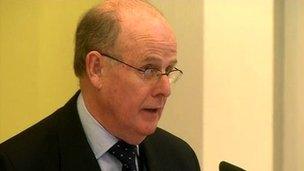Inquiry into abuse in NI children's homes and borstals begins
- Published

Sir Anthony Hart said victims could feel satisfied their experiences were being listened to
Victims have waited years to tell their stories, senior counsel to the biggest public inquiry into child abuse ever held in the UK has said.
The Historical Institutional Abuse, external Inquiry (HIA) is examining abuse claims in Northern Ireland children's homes and juvenile justice.
It was set up by Northern Ireland's power-sharing executive to investigate allegations dating from 1922 to 1995.
To date, 434 people have contacted the inquiry to allege they were abused.
It is investigating claims of physical, sexual, and emotional abuse, as well as childhood neglect.
The senior counsel to the inquiry, Christine Smith, said many victims of abuse "have waited years for this day to come".
"This inquiry, both through the work of the acknowledgement forum and these public hearings, is giving a voice to those who feel the system let them down," Ms Smith said.
She said it was "a human story about how a society treated its most vulnerable members - its children".
"By examining how vulnerable children living in children's homes between 1922 and 1995 were treated, this inquiry will examine the soul of Northern Ireland in that period," she added.
Ms Smith said "abuse in childhood leaves a legacy which can destroy their adulthood as well".
She said one of those who contacted the inquiry said: "Those who suffered abuse were deprived of a normal childhood and haven't been normal since."
'Experiences listened to'
Christine Smith said the inquiry will 'give a voice to those who feel the system let them down'
In his opening remarks, the chairman of the inquiry, Sir Anthony Hart, said it would try to establish if abuse in children's homes was systemic.
He said he hoped those who had given evidence to the inquiry "will have the satisfaction of knowing that their experiences are being listened to and investigated".
Sir Anthony said many of the witnesses had told the inquiry that when they made complaints in the past they had been ignored.
He said where the inquiry believes criminal offences have taken place it will pass the evidence onto the police.
If prosecutions are imminent, evidence relating to them will be aired in closed sessions of the inquiry so as not to prejudice trials, Sir Anthony said.
The inquiry will also speak to 61 child migrants who were sent to Australia on how they were treated before they left Northern Ireland.
Personal stories
Kate Walmsley: "I just needed someone to ask me why was I not happy"
The public hearings stage of the inquiry is being held in Banbridge, County Down, and is expected to last for 18 months.
During that time, it is due to hear evidence from more than 300 witnesses, including former residents who claim they were abused as children, the people who ran the institutions, health and social care officials and government representatives.
The inquiry's remit is limited to children's residential institutions in Northern Ireland.
So far, it is examining claims against 13 children's homes and borstals.
Some of the institutions were run by state authorities, others were staffed by voluntary organisations and the remainder were run by the Catholic Church.
Since October 2012, the inquiry has been taking evidence in private sessions from former residents who claim they were abused.
People making abuse allegations were asked to tell their personal stories to the inquiry's Acknowledgement Forum and those called to give evidence in public will be offered anonymity.
Legal powers
Of the 434 people who have made a formal application to speak to the inquiry, the majority still live in Northern Ireland.
About a third of the applications are from people who are now living elsewhere, including Australia, Great Britain, the Republic of Ireland and other countries.
To date, 263 people have met members of the Acknowledgement Forum to have their allegations recorded.
The HIA inquiry is independent of government and has the power to compel witnesses to give evidence.
It does not have the legal authority to find anyone guilty of criminal acts, but where it does receive evidence that a crime has taken place, the details will be passed to police.
The public hearings opened at Banbridge Courthouse in County Down on Monday afternoon, when the chairman, retired judge Sir Anthony Hart, delivered an opening address.
Over the next three days, the inquiry's legal team is due to provide a general overview, outlining the proceedings and the issues they are expected to address.
When the opening remarks are complete, the first stage of public hearings will concentrate on allegations made against two Catholic children's homes in Londonderry
Nazareth House Children's Home in Bishop Street and St Joseph's Home in Termonbacca were both run by the same order of nuns - the Sisters of Nazareth.
The public hearings are due to finish in June 2015, and the inquiry team has been given a further six months to report its findings to the Stormont Executive.